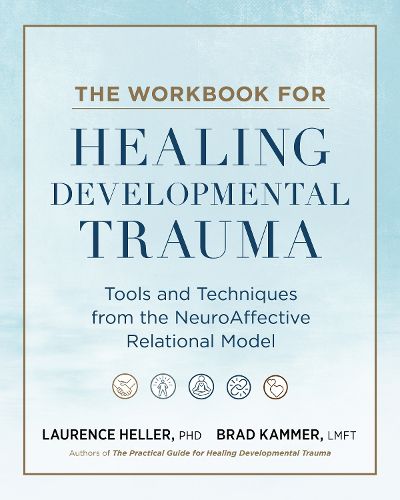Readings Newsletter
Become a Readings Member to make your shopping experience even easier.
Sign in or sign up for free!
You’re not far away from qualifying for FREE standard shipping within Australia
You’ve qualified for FREE standard shipping within Australia
The cart is loading…






A comprehensive workbook for understanding and treating developmental trauma using the NeuroAffective Relational Model (NARM)
Includes practical exercises for understanding ACEs, addressing C-PTSD, nurturing post-traumatic growth, identifying survival styles, and more
Designed for clinicians, trauma therapists, and practitioners of the NeuroAffective Relational Model, this workbook offers a blueprint to NARM's transformative approach to healing developmental trauma. Authors Larry Heller and Brad Kammer share practical skill-building exercises that deepen your own relationship to the material as you learn new, evidence-based, and highly effective ways to work with clients' trauma. Complete with detailed charts, visually engaging graphics, and practitioner-focused questionnaires, this workbook provides tools for use in clinical sessions as well as personal professional growth.
In an easy-to-apply format, the Workbook will explore:
The 5 adaptive survival styles: Learn how developmental needs for connection, attunement, trust, autonomy, and love-sexuality are disrupted by trauma and map onto adaptive survival strategies
The 4 pillars of NARM: Understand and apply key therapeutic skills that support healing and post-traumatic growth
The NARM Relational Model: Facilitate trauma resolution and real therapeutic growth via a dynamic, embodied process
The NARM Emotional Completion Model: Support clients in identifying their primary emotions, reflecting the emotion's intention, and building new relationships to unresolved emotional conflicts
The NARM Personality Spectrum: Use 10 psychobiological traits to understand and assess client self-organization
Heller and Kammer offer personal and therapist-oriented reflection questions to ground your work with NARM and assist you in integrating the model's nuances. Each section is designed to help practitioners translate NARM's advanced concepts into actionable strategies that deepen the therapeutic process-and whether you're new to NARM or seeking to refine your practice, the Workbook equips you with the resources to guide your clients toward profound healing and growth.
$9.00 standard shipping within Australia
FREE standard shipping within Australia for orders over $100.00
Express & International shipping calculated at checkout
A comprehensive workbook for understanding and treating developmental trauma using the NeuroAffective Relational Model (NARM)
Includes practical exercises for understanding ACEs, addressing C-PTSD, nurturing post-traumatic growth, identifying survival styles, and more
Designed for clinicians, trauma therapists, and practitioners of the NeuroAffective Relational Model, this workbook offers a blueprint to NARM's transformative approach to healing developmental trauma. Authors Larry Heller and Brad Kammer share practical skill-building exercises that deepen your own relationship to the material as you learn new, evidence-based, and highly effective ways to work with clients' trauma. Complete with detailed charts, visually engaging graphics, and practitioner-focused questionnaires, this workbook provides tools for use in clinical sessions as well as personal professional growth.
In an easy-to-apply format, the Workbook will explore:
The 5 adaptive survival styles: Learn how developmental needs for connection, attunement, trust, autonomy, and love-sexuality are disrupted by trauma and map onto adaptive survival strategies
The 4 pillars of NARM: Understand and apply key therapeutic skills that support healing and post-traumatic growth
The NARM Relational Model: Facilitate trauma resolution and real therapeutic growth via a dynamic, embodied process
The NARM Emotional Completion Model: Support clients in identifying their primary emotions, reflecting the emotion's intention, and building new relationships to unresolved emotional conflicts
The NARM Personality Spectrum: Use 10 psychobiological traits to understand and assess client self-organization
Heller and Kammer offer personal and therapist-oriented reflection questions to ground your work with NARM and assist you in integrating the model's nuances. Each section is designed to help practitioners translate NARM's advanced concepts into actionable strategies that deepen the therapeutic process-and whether you're new to NARM or seeking to refine your practice, the Workbook equips you with the resources to guide your clients toward profound healing and growth.